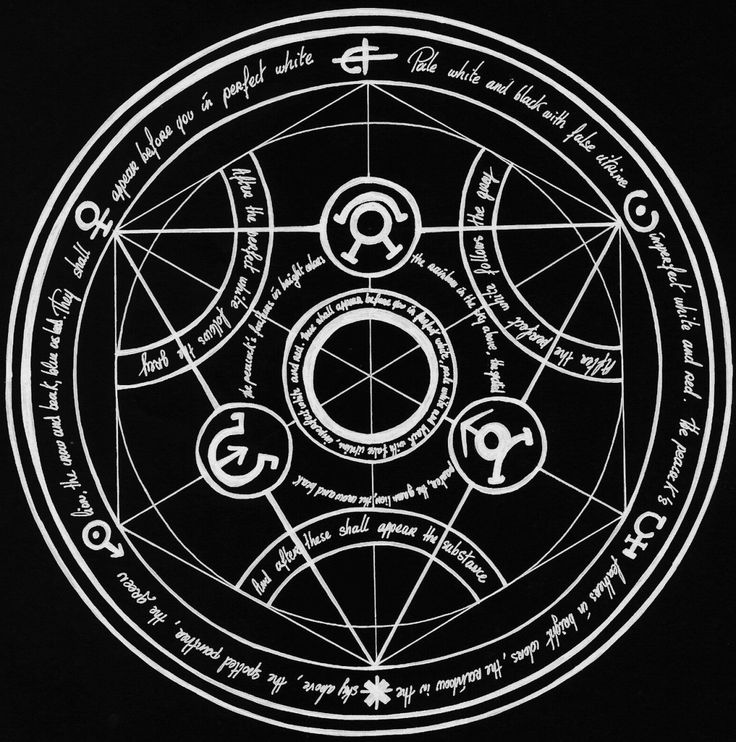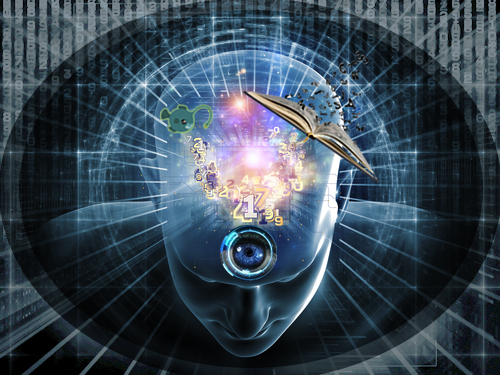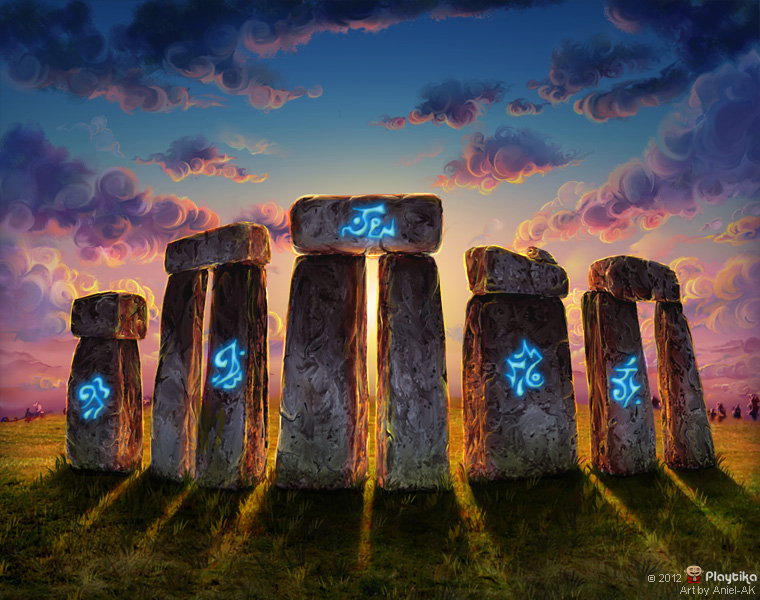Principles of Magic

All magic functions according to the same basic set of principles or laws under which magic will work, and which are required in order to work magic. These principles are Power, Will, Knowledge, and Identity. They govern how much intersects, interacts, and the ways in which Magi use magic. While not absolute, these principles guide nearly all magical practice.
These four principles must act in concert in order for the Magus to successfully and effectively perform magic. One analogy to describe the reltionship is to think of Power as gunpowder, Will as the bullet, Knowledge as the gun, and Identity as the sighting.
Power
The first principle of magic is Power. It is the first because it is the most fundamental. Magic is an energy source, and just like all energy sources, it must be tapped in the correct way before it can be harnessed. In current magical theory, the principle of Power is indentified as a Source. Magi draw on magical energy through the Sources that they have learned to tap into, drawing power into themselves before sending it back outward amplified. Without drawing on a source, a Magus' efforts are for naught. Power is both the filter and focus for all aspects of Magic.
Will
The next required element is the active intent of the Magus to alter the world in some fashion. Without Will, all other the other principles remain inert. The principle of Power represents nothing more than potential power for magic to use; the principle of Will releases that potential. According to this principle, no magic is spontaneously performed. It’s simply impossible to work Magic without the desire to do so. An apprentice can’t boil away her eyes or turn her blood to spiders merely by perusing an old tome. However, this principle doesn’t protect against the misguided application of magic. It’s entirely possible to be attempting to generate one effect and due to an error in execution, create another. Nothing in the principle of Will prevents a Magus from calling forth a demon from the pits of Hell during an inept attempt to create an invisble assistant. Granted, such a mistake is highly unlikely, but the point is the principle of Will is a limiting factor, not a failsafe device.
Knowledge
This principle tempers the force created by Power and Will. Knowledge is the means through which a Magus shapes a Sending. By its very nature, magic seeks the simplest course; that’s why invoking takes such an effort. Only with careful manipulation can a Magus force it along the desired route. The principle of Knowledge includes the learning necessary to conjure magic.
Identity
Every creature, every object, every force in the universe has defining aspects and associations. Early alchemists spent most of their lives studying these intertwining characteristics and designing formulae to exploit them. The practice of magic has taken that concept and further developed it into the principle of Identity. In its most basic form, Identity explains that everything has an essence and that this essence is both individual and shared.
To simplify, consider Identity in terms of colors. The closer the relationship between individual essences, the more similar the colors, but no matter how different the shades, all colors are part of the same spectrum. According to this analogy, one person’s essence might be represented sea blue whereas another is a darker, indigo-blue. Both are the same color, but distinct, nonetheless. To take this line of thinking further, a normal person’s essence may appear as yellow and a Servant, green, either yellowish or blue in tint, depending on the strength of the Servant’s bond. Of course, this is a gross simplification — Identity isn’t as clear-cut as a simple color scheme. Radio waves might also make a good analogy, by which every association is a unique “frequency.”
A Magus uses Identity to target the effects generated by magic. The principle provides clear guidance for a path or ritual after the sending is released by keying the magic to the target’s essence. What the other major principles create, Identity directs. Without it, no control is possible for a Sending’s effect; undirected magic becomes nothing more than energy released randomly into the world.
One particular facet of Identity, True Names, was, at one time, vital to the very heart of magical practice. A True Name (or simply Name) is basically a written or verbal shortcut to the nature of whatever it describes. It contains the definition of the essence of the Named item or being; it puts a name to the color, to use the earlier analogy. A True Name binds the Identity — the very essence — of an individual into a word. Thus, with a Name, a Magus gains complete understanding of the Named object or entity’s essence.

What is a Source?
Magical energy flows throughout the universe as a potent type of energy that permeates everything that connects everything to every other thing. When Magi speak of sources that they draw from, they are referring to how they tap into this field of energy, the means by which they draw that power inward before sending it back outwards to achieve their goals.
Working magic is often referred to as the Art, and not only because of the intricacy of magical practice, but also because it is something that takes time to understand and grasp completely. The interaction of source, technique, and the Magus is convoluted but also relatively simple at its heart.
Sources
- Blood - The magician uses blood to fuel his power. This can be animal blood, the Magus' own, or someone else's, however animal blood is less potent than that of humans or supernatural beings. Additionally, if the blood used is old and hasn't been stored in a special vessel, the power of the magic is lesser than what it would be with fresh blood.
- Passive Effect: Blood Storage - The Magician becomes capable of storing blood in a specially prepared vessel. This vessel can be anything, but must have a lid or a flap to cover the blood. As long as the blood is in this vessel, it will not rot or clot, nor will it spill out of the vessel if overturned accidentally.
- Weakness: If the Magician loses its store of blood it cannot use the magical technique(s) linked to that source with the same degree of strength.
- Bound Spirits - The Magician is able to bind spirits to his service and use them to power his magic. Some spirits will serve the Magician willingly, entering into a contract for a term of service in exchange for certain rites or favors. Ghosts and elemental spirits are vulnerable to this power as well as demons. In the case of demons, the Magician holding the demon has to understand that he is holding a tiger by the tail. If his control over the spirit breaks, the demon is likely to turn on him. A Magician who uses demons as a magical source is different from a Sorcerer, which is a person that is enslaved by demons in return for magic.
- Passive Effect: Spirit Senses - The Magician has a sixth sense which tells him when a spirit from either the lower or upper spirit worlds enter into his presence and permits the magician to see into the spirit world at the sprits around him. The magician can converse with these spirits as desired.
- Weakness: Control over spirits can be hazardous as if the mage loses control those same spirits may turn on the Magus. Further, losing control over spirits weakens the effectiveness of the Magician's techniques linked to this source.
- Faith - Scripture says that faith can move mountains, and in the case of a Magus that draws power from his faith and from whatever higher being/power the character worships. A Magus with this source qualifies as a faithful person, but must be a devout practitioner of a religion to maintain faithful status.
- Passive Effect: The magician has his eyes opened metaphysically, able to perceive other people that have faith and can see and recognize angels for what they are.
- Weakness: Doubt is the enemy of faith. If the magician begins to doubt his faith, his magic falters. If he breaks one of the commandments of his religion, he loses access to his magic until he atones or is absolved.
- Leylines/Geomancy - Criss-crossing the earth are invisible lines of power, a sort of energy that is generated by the earth itself. In some ways these lines resemble magnetic fields or electrical current, appearing to a person who can perceive them as shimmering blue energy. The Magus with this source is able to recognize and tap these lines of power, using the innate energies of the earth to fuel the magic. Using this power, sometimes called 'tapping the line', creates a sort of emotional high that can be addicting.
- Passive Effect: Draw Power - The Magus can draw more power from leylines than most other magicians can from their various sources. They can also store this energy in crystal or gemstones creating batteries for themselves to be drawn on later. These batteries must be recharged.
- Weakness: Magicians with this source have a bad habit of allowing their egos to swell with the amount of power they can draw on. Additionally, the further a magician with this source moves away from the leylines the weaker their magic can grow.
- Lifeweb - There is another type of energy fueled by the earth, but this one takes the form of the energy that all living things generate. The Magus is able to tap into this energy, drawing on the power of the life around her to fuel her magical prowess. In so doing, the Magician must be cautious as drawing too much power from the things around her can kill those same things.
- Passive Effect: Pulse of the Invisible - Because the magician draws power from life and living things around herself, she gains a sense of the amount of life, and thus energy, around her. This makes the Magus incredibly difficult to sneak up on, as the magician becomes aware of the movement of living things around her.
- Weakness: This connection with all living things around the magician can be a curse. Because the magician draws power from living things, she can draw on these things hard enough to kill them. When this happens, the magician feels each of those deaths.
- Necrotic Energies - One of the most dangerous forms of energy for a magician to tap, the Magus draws on the powers inherent to unlife, death, and darkness, using these powers to fuel his magic. The Magus can use these energies where they occur naturally, or use the animate dead, necromancers, and vampires as batteries. Vampires do not enjoy being used as mystical batteries, but a magician with this source can use them as such, accepting the risk of earning the vampire's wrath.
- Passive Effect: Resilience - In channeling the power of death and undeath, the magician draws some of that power into its body fortifying its flesh to become more resilient and resistant to damage or injury.
- Weakness: Humanity is not meant to meddle with some powers and a magician with this source radiates a sense of unnaturalness which makes people nervous and fearful about the magician. Additionally, the magus gains a necrotic aura which lets vampires and necromancers exercise certain powers on or against the magus.
- Power Item - The magician draws his magical prowess from an item. This item can be something significant to the magician himself, an heirloom passed down through the ages within a family, or something found. Portable objects are preferred as using this power source requires the Magus to be in close vicinity of it in order to work their magic. If the power item is too large to carry, the Magus is limited to working magic wherever the item is located. For example, if a coven or family has built a power item into their house, they can draw upon it in that dwelling, but cannot use anywhere else.
- Passive Effect: Reinforcement - The magician with this source subtly changes the nature of the item which serves as the source. The item becomes supernaturally strengthened, capable of intercepting bullets or taking hits from supernatural strength without breaking.
- Weakness: The item is the source of the magician's power and if stolen, taken away, or out of reach, the magician is unable to work magic.
- Power Substance - Some magicians believe they have to ingest or imbibe something in order to work their magic. For some shamans this may be mushrooms, for a Native American it may be peyote. Regardless of what the substance is, the magician has to ingest it or in some other way apply it to their bodies before they can work their magic.
- Passive Effect: Magicians with this source are accustomed to imbibing large quantities of the substance that empowers their magic. They become immune to the harmful effects of poisons or toxins.
- Weakness: Remove the ability of the magician to find their chosen substance and you remove the ability of the Magus to work magic. In addition, the substance in question may be illegal, hard to find, or somehow foul (such as demon's blood).
- The Elements - There is a wealth of power within the natural world, most of which manifests through the four primal elements: earth, wind, water, and fire. The Magus with the elements as a source can draw power from manifestations of those natural elements and use them to empower their magic. Magi pick a single element of Earth, Air, Fire, or Water every time they adopt this source, able to switch between the elements at whim and need.
- Passive Effect: Elemental Strength - When the Magus casts a spell that resonates with a given element, its power is amplified significantly.
- Weakness: The Magus is vulnerable to magic or effects which use an element opposite of the chosen source. Air feeds fire and fire is consumed by water. Earth smothers air, but is weakened by water. Air consumes water.
